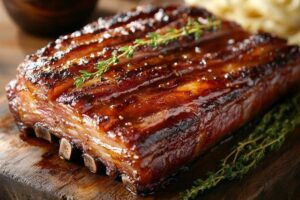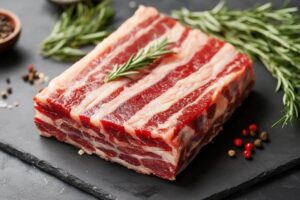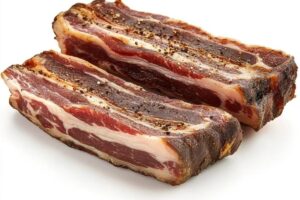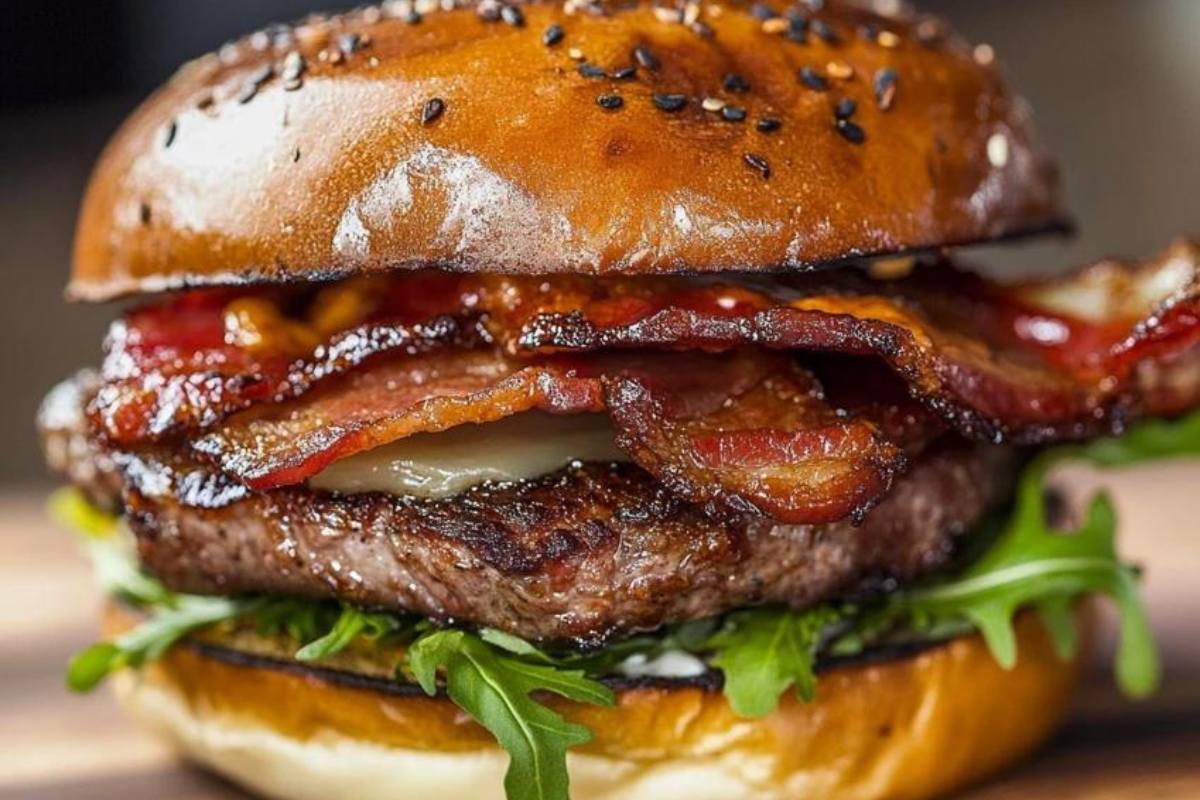When people think of bacon, most picture crispy, fatty pork slices sizzling in a pan. Bacon holds a special place in breakfast dishes, sandwiches, and even desserts. But for those avoiding pork for health, dietary, or religious reasons, beef bacon might seem like a tempting alternative. So, why hasn’t beef bacon achieved the same popularity as pork bacon?
In this article, we explore the reasons beef bacon hasn’t gained traction like pork bacon. We’ll dive into factors such as taste, cost, culture, and marketing challenges, which all contribute to why beef bacon remains a niche product.
What is Beef Bacon?
To understand why beef bacon lags behind in popularity, it’s important to know what it is. Beef bacon is made from the fatty belly or brisket of beef. The process of curing, smoking, and slicing is similar to that used for pork bacon. However, beef bacon is leaner, containing less fat, which results in a different flavor and texture.
Instead of the rich, fatty mouthfeel of pork bacon, beef bacon offers a robust, meaty taste. Consumers often describe it as chewier and less crispy than pork bacon. This difference may explain why some are reluctant to make the switch. However, for those seeking a healthier or non-pork alternative, beef bacon provides a solid option. For a more in-depth look at beef bacon, this guide on beef bacon breaks down its production and culinary uses.
Why is Pork Bacon So Popular?
One major hurdle for beef bacon is the overwhelming popularity of pork bacon. For centuries, pork bacon has been a dietary staple, especially in the United States and Europe. The taste and texture of pork bacon—crispy, smoky, and fatty—are comforting and deeply ingrained in food traditions.
The rise of pork bacon ties closely to history and culture. Pork is one of the most widely consumed meats, and bacon is a favored cut. Fast food chains, restaurants, and big food brands constantly promote pork bacon, making it a household staple. On the other hand, beef bacon lacks this widespread marketing. For more insights into how beef bacon compares to pork, check out this detailed resource.
The Price Factor: Beef vs. Pork

One of the major reasons beef bacon struggles to compete with pork bacon in terms of popularity is the price difference. Beef, in general, is more expensive to produce than pork, and this cost disparity directly impacts consumer choices. Below, we explore why beef bacon tends to carry a higher price tag and how this affects its market position.
1. Cost of Raising Cattle vs. Pigs
- Raising cattle requires significantly more resources than raising pigs. Cows need more land, water, and food to grow to maturity compared to pigs. These additional costs contribute to the higher overall price of beef products, including beef bacon.
- Cattle also take longer to reach market weight, which means farmers invest more time and resources in raising them. This longer production cycle adds to the higher cost of beef as a meat source.
2. Processing and Production Costs
- Producing beef bacon is more labor-intensive and costly than producing pork bacon. The cuts of meat used in beef bacon—typically the beef belly or brisket—are leaner and require more intricate processing. This differs from pork bacon, which is derived from the pork belly, a fatty and easier-to-process cut.
- Additionally, the lower fat content in beef makes it harder to replicate the crispy texture of pork bacon, which means producers need to invest in more sophisticated curing and smoking processes. These extra production steps add to the cost of beef bacon.
3. Limited Scale of Production
- Beef bacon is produced on a much smaller scale compared to pork bacon. While pork bacon is a staple item in most households and receives significant marketing attention, beef bacon remains a specialty product. The smaller production volume means that economies of scale (which help reduce costs in large-scale production) don’t apply as strongly to beef bacon.
- The niche market for beef bacon—mainly consumers with dietary restrictions, health-conscious eaters, or those looking for non-pork alternatives—limits its widespread availability and contributes to its higher price. This scarcity drives up the price even further.
4. Consumer Perception of Value
- Most consumers view pork bacon as an affordable indulgence. It’s relatively inexpensive, easy to find, and delivers a satisfying, rich flavor that many people associate with comfort food. When consumers see beef bacon priced higher, they might not perceive it as a better value unless they have specific dietary or health needs.
- For many, the idea of paying more for beef bacon, which may not offer the same familiar crispy, fatty texture as pork bacon, can be a tough sell. As a result, most shoppers stick with the more affordable and widely available option—pork bacon.
5. Price Impact on Popularity
- The higher cost of beef bacon limits its appeal to budget-conscious consumers, who often opt for the cheaper and more familiar pork bacon. Even among consumers who seek out alternatives due to religious or dietary reasons, options like turkey bacon—which is often less expensive than beef bacon—are more popular.
- Price-sensitive shoppers often see beef bacon as a luxury or specialty item, which can keep it from achieving mainstream popularity. Until the production costs of beef bacon come down or consumer demand increases to justify the higher price, it will likely remain a niche product.
Final Thoughts on the Price Factor
In summary, the cost difference between beef bacon and pork bacon is a major factor contributing to the former’s limited popularity. Beef requires more resources to raise, process, and produce, which leads to a higher retail price. For many consumers, the higher price of beef bacon—combined with its differences in taste and texture—makes it a less attractive option when compared to the more affordable pork bacon. This price factor creates a significant barrier for beef bacon to break into the mainstream market.
Taste and Texture Differences
Taste and texture play a big role in why pork bacon remains dominant. Pork bacon is known for its richness and crunch. It crisps up easily, offering a balance of fat and flavor that many people love. In contrast, beef bacon is leaner and often chewier.
While some enjoy the meaty flavor of beef bacon, many prefer the fattiness and crispiness of pork bacon. Beef bacon doesn’t render as much fat during cooking, which affects its texture and flavor. These differences can be a dealbreaker for consumers who are used to the traditional qualities of pork bacon.
Nutritional Benefits of Beef Bacon
One of the main advantages of beef bacon is its nutritional profile, especially compared to pork bacon. For those who are conscious of fat intake or follow specific dietary plans like keto or paleo, beef bacon presents a healthier alternative without sacrificing flavor. Below, we break down the key nutritional benefits of beef bacon.
1. Lower in Fat
- Beef bacon tends to be significantly lower in fat than pork bacon, especially when sourced from grass-fed beef. This leaner composition makes it appealing for those looking to cut down on saturated fats, which are linked to higher cholesterol levels.
- While pork bacon is known for its high fat content, which contributes to its crispy texture, beef bacon offers a lighter alternative. Depending on the cut of beef used, beef bacon can have up to 90% lean meat, compared to the higher fat content of pork bacon.
2. Higher in Protein
- Beef bacon is a more protein-rich option compared to pork. Protein is essential for muscle growth, repair, and overall body function. Those on high-protein diets, such as keto or paleo, may find beef bacon to be a better fit for their dietary needs.
- On average, a serving of beef bacon contains more protein than an equivalent serving of pork bacon. This makes it ideal for individuals looking to boost their protein intake while reducing their fat consumption.
3. Fewer Calories
- With its lower fat content, beef bacon also tends to be lower in calories than pork bacon. This makes it a good option for people following calorie-controlled diets or those aiming to maintain a leaner physique.
- A single serving of beef bacon can have up to 30% fewer calories than the same amount of pork bacon, making it a guilt-free option for bacon lovers trying to stay within their daily calorie goals.
4. Rich in Essential Nutrients
- Grass-fed beef bacon contains higher levels of omega-3 fatty acids and other essential nutrients such as vitamin B12, iron, and zinc. These nutrients support a healthy immune system, improve energy levels, and contribute to overall well-being.
- The quality of the beef used in beef bacon also plays a role in its nutritional value. Grass-fed beef, in particular, offers more antioxidants and healthier fats compared to conventionally raised beef or pork.
5. Reduced Sodium Levels (in Some Varieties)
- Many people worry about the high sodium content in bacon, which can contribute to high blood pressure and other health issues. Some producers of beef bacon offer lower-sodium varieties, which help reduce the risks associated with excessive salt intake.
- While traditional bacon is often loaded with salt, beef bacon manufacturers have responded to consumer demand for healthier options by offering reduced-sodium products.
Nutritional Benefits
In summary, beef bacon offers several nutritional advantages over pork bacon, particularly for those looking to reduce their fat intake, increase protein, and maintain a lower-calorie diet. It also contains essential vitamins and minerals, making it a more nutrient-dense option. However, the choice between beef and pork bacon ultimately depends on personal taste preferences and dietary goals.
While it may not have the crispy, fatty texture of traditional pork bacon, beef bacon remains a strong contender for health-conscious consumers and those seeking an alternative due to dietary restrictions or personal preferences.
Cultural and Religious Influences

Certain cultural and religious groups favor beef bacon due to dietary restrictions. Individuals who follow halal or kosher laws cannot consume pork, making beef bacon a suitable alternative. However, even within these groups, beef bacon is not always the first choice. Many turn to turkey bacon or plant-based alternatives, which are often more affordable and widely available.
The dietary restrictions of these communities provide a niche market for beef bacon, but they also highlight its competition with other non-pork alternatives.
Availability and Marketing Issues
One reason beef bacon hasn’t gained popularity is its limited availability. It isn’t as widely stocked in grocery stores and restaurants as pork bacon. Even in places where demand for non-pork alternatives exists, turkey bacon and plant-based options are more accessible.
The lack of consumer awareness about beef bacon also contributes to its niche status. While pork bacon enjoys massive marketing, beef bacon receives little attention from major food companies. Until more effort goes into promoting beef bacon and educating consumers about its benefits, it will likely remain less popular.
Production Challenges for Beef Bacon
Making beef bacon presents some unique challenges. Beef has a lower fat content than pork, making it harder to create a bacon product with the same mouthfeel. Beef belly contains more muscle, which changes both the texture and the flavor of the final product.
Raising cattle also costs more than raising pigs, further driving up the price of beef bacon. These production hurdles explain why fewer companies invest in producing beef bacon on a large scale, which limits its availability and popularity.
Health Trends and Beef Bacon
The growing movement toward healthier eating could help increase demand for beef bacon. Consumers today are more conscious of their fat intake and look for cleaner, healthier protein sources. For those who prioritize grass-fed, high-protein meats, beef bacon fits the bill.
That said, this health trend hasn’t yet fully embraced beef bacon. People who want to lower their fat intake usually choose turkey bacon or plant-based options over beef. The healthier aspects of beef bacon may not be enough to sway those consumers.
Tradition’s Role in Bacon Choices
A big reason beef bacon struggles to gain popularity is the role tradition plays in food choices. In many Western countries, pork bacon has been a breakfast staple for generations. The association between bacon and pork runs deep in the culinary world, and consumers are often reluctant to break with tradition.
Comfort foods like pork bacon have a loyal following. The familiar smoky flavor and crispy texture of pork bacon make it difficult for alternatives like beef bacon to gain a foothold.
The Future of Beef Bacon

Despite the challenges, beef bacon could still carve out a larger niche in the future. As health trends continue to favor leaner meats and alternative proteins, beef bacon might attract more attention. Increasing awareness and availability will be key.
However, to reach mainstream success, beef bacon needs more marketing, better distribution, and efforts to educate consumers about its benefits. Until then, it will remain a specialty product that caters to a specific audience.
FAQs
Why is beef bacon not more common?
- Beef bacon isn’t more common due to higher costs, limited availability, and the entrenched popularity of pork bacon.
Is beef bacon healthier than pork bacon?
- Yes, beef bacon is often healthier because it has less fat and more protein, especially when made from grass-fed beef.
What does beef bacon taste like compared to pork bacon?
- Beef bacon has a more meaty and robust flavor compared to the smoky, crispy taste of pork bacon. It’s often leaner and chewier, which can affect its texture during cooking.
Where can I buy beef bacon?
- Beef bacon can be found in specialty grocery stores, halal or kosher markets, and online retailers. Brands like Uncle Marv’s and other specialty food producers offer it for purchase through their websites.
In conclusion, beef bacon offers a leaner, higher-protein, and non-pork alternative to traditional pork bacon. Despite its potential health benefits, it remains a niche product for several reasons: higher costs, limited availability, taste and texture differences, and the strong cultural preference for pork bacon. However, as consumer preferences evolve and awareness grows, beef bacon may find its place in the broader market. For now, though, pork bacon continues to dominate the breakfast table.
With increased marketing and better distribution, there’s potential for beef bacon to become a more popular option, especially among health-conscious consumers and those with religious dietary restrictions.

